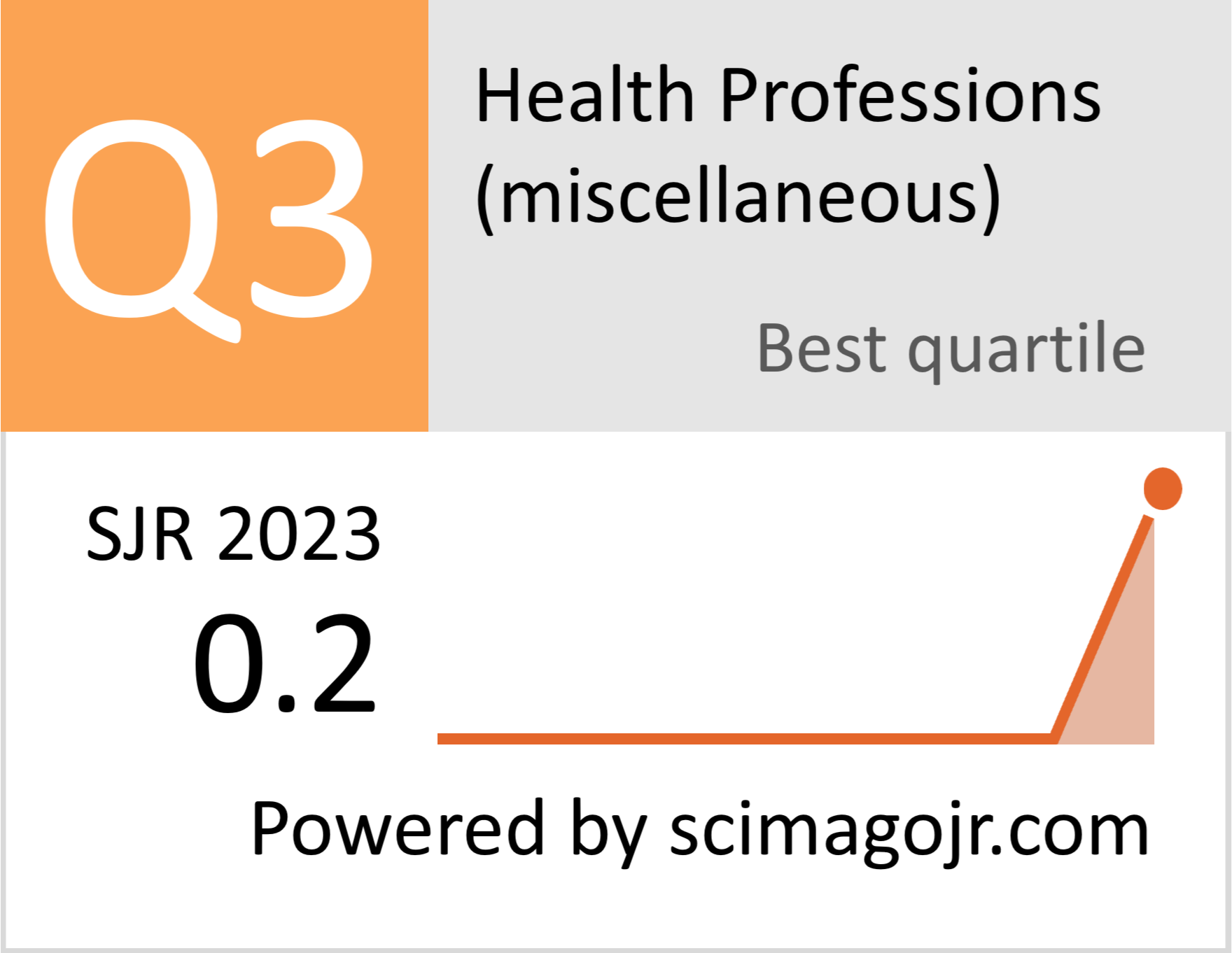Is it always Laryngopharyngeal Reflux? How Voice Disorders Can Manifest as LPR
¿Es siempre reflujo laríngeo-faríngeo? Cómo los trastornos de la voz pueden presentarse como LPR

This work is licensed under a Creative Commons Attribution-NonCommercial-NoDerivatives 4.0 International License.
Show authors biography
Introduction. Laryngopharyngeal reflux (LPR) manifests with a constellation of common throat symptoms and inconclusive signs on laryngoscopic exam. It is a diagnosis, often made clinically, that can lead to prescriptions of proton pump inhibitors that are unnecessary and potentially harmful. Glottic insufficiency (GI) and the accompanying hyperfunctional laryngeal behaviors can also present with similar, common throat complaints that may or may not include a qualitative change to the voice.
Methods. This is a reflection article. It is written to summarize, explain, and support with evidence the opinion of the author on the topic of how symptoms of voice disorders can easily be mistaken for symptoms of LPR. The offered reflection is based on his experience, research and the available literature.
Reflection. This article intends to explore the similarities between GI and LPR, how to ultimately differentiate them and how to approach treatment with a broader differential diagnosis.
Conclusion. LPR and GI can present with identical, vague throat, and voice symptoms. Empiric medication trials, behavioral interventions and objective laryngovideostroboscopy, impedance-based reflux, and esophageal motility testing may all be needed, sometimes in a trial and error fashion, to correctly diagnose and treat a patient’s symptoms.
Article visits 1328 | PDF visits 139
- Cohen SM, Garrett CG. Hoarseness: Is It Really Laryngopharyngeal Reflux? The Laryngoscope. 2008;118(2):363-6. doi: https://doi.org/10.1097/MLG.0b013e318158f72d
- Gooi Z, Ishman SL, Bock JM, Blumin JH, Akst LM. Changing Patterns in Reflux Care 10-Year Comparison of ABEA Members. Annals of Otology, Rhinology & Laryngology. 2015. doi: https://doi.org/10.1177/0003489415592407
- Carroll TL, Werner A, Nahikian K, Dezube A, Roth DF. Rethinking the Laryngopharyngeal Reflux Treatment Algorithm: Evaluating an Alternate Empiric Dosing Regimen and Considering up-Front, PH-Impedance, and Manometry Testing to Minimize Cost in Treating Suspect Laryngopharyngeal Reflux Disease. The Laryngoscope, 2017;127:S1-S13. doi: https://doi.org/10.1002/lary.26806
- Francis DO, Rymer JA, Slaughter JC, James C, Choksi Y, Jiramongkolchai P, Ogbeide, et al. High economic burden of caring for patients with suspected extraesophageal reflux. The American journal of gastroenterology. 2013;108(6):905-911. doi: https://doi.org/10.1038/ajg.2013.69
- Lechien JR, Bock JM, Carroll TL, Akst LM. Is Empirical Treatment a Reasonable Strategy for Laryngopharyngeal Reflux? A Contemporary Review. Clinical Otolaryngology. 2020;45(4):450-458. doi: https://doi.org/10.1111/coa.13518
- Lechien JR, Bobin F, Dapri G, Eisendrath P, Salem C, Mouawad F, et al. Hypopharyngeal-Esophageal Impedance-pH Monitoring Profiles of Laryngopharyngeal Reflux Patients. Laryngoscope. 2021 Feb;131(2):268-276. doi: https://doi.org/10.1002/lary.28736
- Johnston N, Dettmar PW, Bishwokarma B, Lively MO, Koufman JA. Activity/stability of human pepsin: implications for reflux attributed laryngeal disease. Laryngoscope. 2007;117(6):1036-1039. doi: https://doi.org/10.1097/MLG.0b013e31804154c3
- Johnston N, Dettmar PW, Strugala V, Allen JE, Chan WW. Laryngopharyngeal reflux and GERD. Ann N Y Acad Sci. 2013 Oct;1300:71-9. doi: https://doi.org/10.1111/nyas.12237
- Adhami T, Goldblum JR, Richter JE, Vaezi MF. The role of gastric and duodenal agents in laryngeal injury: an experimental canine model. Am J Gastroenter. 2004;99:2098-2106. doi: https://doi.org/10.1111/j.1572-0241.2004.40170.x
- Lechien JR, De Vos N, Everard A, Saussez S. Laryngopharyngeal Reflux: The Microbiota Theory. Medical Hypotheses. 2021;146:110460. doi: https://doi.org/10.1016/j.mehy.2020.110460
- Rafii B, Taliercio S, Achlatis S, Ruiz R, Amin MR, Branski RC. Incidence of Underlying Laryngeal Pathology in Patients Initially Diagnosed with Laryngopharyngeal Reflux. The Laryngoscope. 2014;124(6):1420-1424. doi: https://doi.org/10.1002/lary.24483
- Koufman J Sataloff RT, Toohill R. Laryngopharyngeal Reflux: Consensus Conference Report. Journal of Voice. 1996;10(3):215-216. doi: https://doi.org/10.1016/S0892-1997(96)80001-4
- Park W, Hicks DM, Khandwala F, Richter JE, Abelson TI, Milstein C, et al.. Laryngopharyngeal Reflux: Prospective Cohort Study Evaluating Optimal Dose of Proton-Pump Inhibitor Therapy and Pretherapy Predictors of Response: The Laryngoscope. 2005;115(7):1230-1238. doi: https://doi.org/10.1097/01.MLG.0000163746.81766.45
- Krill JT, Naik RD, Higginbotham T, Slaughter JC, Holzman MD, Francis DO, et al.. Association Between Response to Acid-Suppression Therapy and Efficacy of Antireflux Surgery in Patients With Extraesophageal Reflux. Clinical Gastroenterology and Hepatology. 2017;15(5):675-681. doi: https://doi.org/10.1016/j.cgh.2016.10.031
- Lechien JR, Bobin F, Muls V, Thill M, Horoi M, Ostermann K, et al.Validity and Reliability of the Reflux Symptom Score. The Laryngoscope. 2019. doi: https://doi.org/10.1002/lary.28017
- Lechien JR, Rodriguez Ruiz A, Dequanter D, Bobin F, Mouawad F, Muls V, Huet K, Harmegnies B, Remacle S, Finck C, Saussez S. Validity and Reliability of the Reflux Sign Assessment. Ann Otol Rhinol Laryngol. 2020 Apr;129(4):313-325. doi: https://doi.org/10.1177/0003489419888947
- Hoppo T, Komatsu Y, Jobe BA. Antireflux Surgery in Patients With Chronic Cough and Abnormal Proximal Exposure as Measured by Hypopharyngeal Multichannel Intraluminal Impedance. JAMA Surg 2013;148(7):608-605. doi: https://doi.org/10.1001/jamasurg.2013.1376
- Klepser DG, Collier DS, Cochran GL. Proton pump inhibitors and acute kidney injury: a nested case-control study. BMC Nephrol. 2013;14:150. doi: https://doi.org/10.1186/1471-2369-14-150
- Kwok CS, Arthur AK, Anibueze CI, Singh S, Cavallazzi R, Loke YK. Risk of Clostridium difficile infection with acid suppressing drugs and antibiotics: meta-analysis. Am J Gastroenterol. 2012;107(7):1011-1019. doi: https://doi.org/10.1038/ajg.2012.108
- McDonald EG, Milligan J, Frenette C, Lee TC. Continuous Proton Pump Inhibitor Therapy and the Associated Risk of Recurrent Clostridium difficile Infection. JAMA Intern Med. 2015;175(5):784-791. doi: https://doi.org/10.1001/jamainternmed.2015.42
- Gomm W, von Holt K, Thomé F, Maier W, Fink A, Doblhammer G, Haenisch B. Association of Proton Pump Inhibitors with Risk of Dementia: A Pharmacoepidemiological Claims Data Analysis. JAMA Neurol. 2016 Apr;73(4):410-6. doi: https://doi.org/10.1001/jamaneurol.2015.4791
- Belafsky, P. Muscle Tension Dysphonia as a Sign of Underlying Glottal Insufficiency. Otolaryngology - Head and Neck Surgery. 2002;127(5):448-451. doi: https://doi.org/10.1067/mhn.2002.128894
- Altman KW, Atkinson C, Lazarus C. Current and emerging concepts in muscle tension dysphonia: a 30-month review. J Voice. 2005 Jun;19(2):261-7. doi: https://doi.org/10.1016/j.jvoice.2004.03.007
- Keesecker SE, Murry T, Sulica L. Patterns in the evaluation of hoarseness: Time to presentation, laryngeal visualization, and diagnostic accuracy. The Laryngoscope. 2015;125(3):667-73. doi: https://doi.org/10.1002/lary.24955
- Patel AK, Mildenhall NR, Kim W, Carroll TL. Symptom overlap between laryngopharyngeal reflux and glottic insufficiency in vocal fold atrophy patients. Ann Otol Rhinol Laryngol. 2014 Apr;123(4):265-70. doi: https://doi.org/10.1177/0003489414525021
- Crawley BK, Murry T, Sulica L. Injection Augmentation for Chronic Cough. J Voice. 2015 Nov;29(6):763-7. doi: https://doi.org/10.1016/j.jvoice.2015.01.001
- Kang CH, Hentz JG, Lott DG. Muscle Tension Dysphagia: Symptomology and Theoretical Framework. Otolaryngol Head Neck Surg. 2016 Nov;155(5):837-842. doi: https://doi.org/10.1177/0194599816657013
- Lechien JR, Saussez S, Nacci A, Barillari MR, Rodriguez A, Le Bon SD, et al. Association between laryngopharyngeal reflux and benign vocal folds lesions: A systematic review. Laryngoscope. 2019 Sep;129(9):E329-E341. doi: https://doi.org/10.1002/lary.27932
- Rees CJ, Henderson AH, Belafsky PC. Postviral vagal neuropathy. Ann Otol Rhinol Laryngol. 2009 Apr;118(4):247-52. doi: https://doi.org/10.1177/000348940911800402
- Borges LF, Salgado S, Hathorn KE, Feldman N, Carroll TL, Chan WW. Failed Swallows on High-Resolution Manometry Independently Correlates with Severity of LPR Symptoms. J Voice. 2022 Nov;36(6):832-837. doi: https://doi.org/10.1016/j.jvoice.2020.09.003
- Yadlapati R, Kaizer AM, Sikavi DR, Greytak M, Cai JX, Carroll TL, et al. Distinct Clinical Physiologic Phenotypes of Patients With Laryngeal Symptoms Referred for Reflux Evaluation. Clinical Gastroenterology and Hepatology [Internet]. 2022 Apr;20(4):776-786.e1. doi: http://dx.doi.org/10.1016/j.cgh.2021.05.025
- Sikavi DR, Cai JX, Carroll TL, Chan WW. Prevalence and clinical significance of esophageal motility disorders in patients with laryngopharyngeal reflux symptoms. J Gastroenterol Hepatol. 2021 Aug;36(8):2076-2082. doi: https://doi.org/10.1111/jgh.15391
- Carroll TL, Rosen CA. Trial vocal fold injection. J Voice. 2010 Jul;24(4):494-8. doi: https://doi.org/10.1016/j.jvoice.2008.11.001
- Johnston N, Wells CW, Samuels TL, Blumin JH. Rationale for targeting pepsin in the treatment of reflux disease. Ann Otol Rhinol Laryngol. 2010 Aug;119(8):547-58. doi: https://doi.org/10.1177/000348941011900808
- Allen J, White CJ, Leonard R, Belafsky PC. Effect of cricopharyngeus muscle surgery on the pharynx. Laryngoscope. 2010 Aug;120(8):1498-503. doi: https://doi.org/10.1002/lary.21002
- Carroll TL, Faudoa E, Van Doren M. Evaluation of a Shorter Follow-up Time to Capture Benefit of a Trial Vocal Fold Augmentation. Journal of Voice. 2019;33(2):169-175. doi: https://doi.org/10.1016/j.jvoice.2017.10.017
- Belafsky PC, Postma GN, Koufman JA. The validity and reliability of the reflux finding score (RFS). Laryngoscope. 2001 Aug;111(8):1313-7. doi: https://doi.org/10.1097/00005537-200108000-00001
- Brauer DL, Tse KY, Lin JC, Schatz MX, Simon RA. The Utility of the Reflux Symptom Index for Diagnosis of Laryngopharyngeal Reflux in an Allergy Patient Population. J Allergy Clin Immunol Pract. June 2017;6(1):132-138. doi: https://doi.org/10.1016/j.jaip.2017.04.039
- DeVore EK, Chan WW, Shin JJ, Carroll TL. Does the Reflux Symptom Index Predict Increased Pharyngeal Events on HEMII-pH Testing and Correlate with General Quality of Life? J Voice. 2021 Jul;35(4):625-632. doi: https://doi.org/10.1016/j.jvoice.2019.11.019
- Belafsky PC, Postma GN, Koufman JA. The Validity and Reliability of the Reflux Finding Score (RFS). The Laryngoscope. 2001 Aug 1;111(8):1313-7. doi: https://doi.org/10.1097/00005537-200108000-00001
- Hicks DM, Ours TM, Abelson TI, Vaezi MF, Richter JE. The prevalence of hypopharynx findings associated with gastroesophageal reflux in normal volunteers. J Voice. 2002;16(4):564-579. doi: https://doi.org/10.1016/S0892-1997(02)00132-7
- Milstein CF, Charbel S, Hicks DM, Abelson TI, Richter JE, Vaezi MF. Prevalence of laryngeal irritation signs associated with reflux in asymptomatic volunteers: impact of endoscopic technique (rigid vs. flexible laryngoscope). Laryngoscope. 2005;115(12):2256-2261. doi: https://doi.org/10.1097/01.mlg.0000184325.44968.b1
- Chang BA, MacNeil SD, Morrison MD, Lee PK. The Reliability of the Reflux Finding Score Among General Otolaryngologists. J Voice. 2015;29(5):572-577. doi: https://doi.org/10.1016/j.jvoice.2014.10.009
- Cumpston EC, Blumin JH, Bock JM. Dual pH with Multichannel Intraluminal Impedance Testing in the Evaluation of Subjective Laryngopharyngeal Reflux Symptoms. Otolaryngol Head Neck Surg. 2016 Dec;155(6):1014-1020. doi: https://doi.org/10.1177/0194599816665819
- Lee YC, Kwon OE, Park JM, Eun YG. Do laryngoscopic findings reflect the characteristics of reflux in patients with laryngopharyngeal reflux? Clin Otolaryngol. June 2017;43(1):137-143. doi: https://doi.org/10.1111/coa.12914
- Lechien JR, Rodriguez Ruiz A, Dequanter D, Bobin F, Mouawad F, Muls V, et al. Validity and Reliability of the Reflux Sign Assessment. Ann Otol Rhinol Laryngol. 2020 Apr 1;129(4):313-25. doi: https://doi.org/10.1177/0003489419888947



